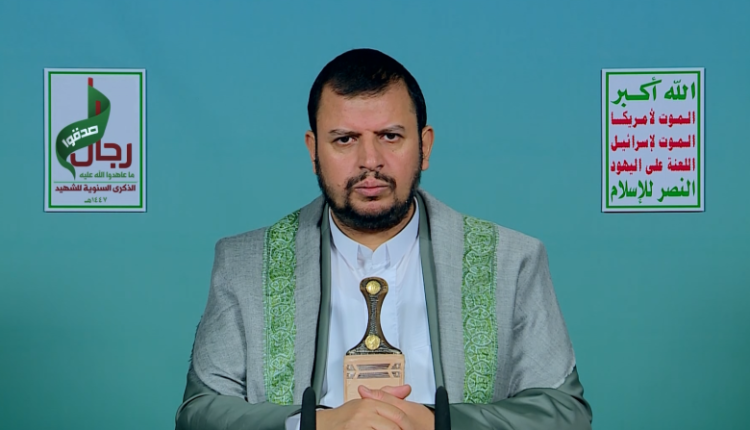The Revolutionary Leader’s Address and the Strategic Choice for a New Round of Confrontation with the Zionist Entity
The speech delivered by Sayyid Abdul-Malik Badr al-Din al-Houthi on Martyrs’ Day stands as a strategic manifesto redefining the equation of conflict across the entire region by linking Yemen’s destiny to that of the broader Islamic nation — and particularly to the Palestinian cause.
Far from being a commentary on the present, the address lays out a forward-looking framework for the next phase of struggle, positioning the “living forces” of the Ummah — embodied in the resistance movements — as the central actors, after official Arab regimes abandoned their roles and turned into instruments of the U.S.–Israeli project.
What distinguishes this address is the organic fusion between the doctrinal and the strategic: the legitimacy of resistance flows from Islamic faith, while the strength of faith is proven through its embodiment on the battlefield.
From Defense to Initiative: A New Strategic Posture
Al-Houthi begins with a pivotal assertion — that Yemen emerges from the previous round of confrontation “stronger than before.” This forms the foundation of a new narrative in which resistance forces move from defense to initiative, transforming collective consciousness throughout the region.
Resistance is no longer one option among many; it has become the sole path to dignity and survival. The call to “build upon readiness for the coming round” signals the end of reactive politics and the dawn of a proactive strategy based on cumulative strength — military, organizational, and ideological.
This vision reflects a profound awareness that the confrontation with the U.S.–Israeli project is existential and long-term, not a temporary military episode, but a civilizational battle requiring a comprehensive architecture of endurance and resistance.
Redefining the Enemy and the Scope of the Struggle
In Al-Houthi’s discourse, the enemy is not merely an occupying settler regime in Palestine; it is a global system of domination led by the United States, backed by Western powers, and facilitated by Arab regimes that have reached a state of moral decay, openly normalizing and trading with Israel even as it commits genocidal crimes in Gaza.
This comprehensive definition transforms the conflict from a territorial or national-liberation issue into a civilizational struggle between two projects:
A U.S.–Israeli axis built on hegemony, exploitation, and the subjugation of peoples.
A resistance axis, representing the “living forces” of the Ummah, built on liberation, justice, and human dignity.
Countering the Narrative of Demonization
Al-Houthi denounces the so-called “moderates” and “domesticated voices” who smear every supporter of Palestine as an “Iranian tool,” a label taken directly from Washington and Tel Aviv’s propaganda lexicon.
Rather than defensively rebutting such accusations, the speech reverses the narrative, exposing these figures as moral proxies for imperialism — guardians of colonial interests masquerading as voices of reason.
The Awakening of Global Conscience vs. Arab Official Decay
A key insight in the speech lies in the historic paradox it highlights: while global public opinion — including parts of Western societies — has awakened to the reality of Zionist atrocities, certain Arab elites continue to ignore or even participate in those crimes.
This glaring disconnect between the will of the peoples and the corruption of the ruling elites places the normalizing regimes in an indefensible moral and political position, severed not only from their citizens but from the collective conscience of humanity.
Thus, the resistance forces emerge as the true representatives of the Ummah’s will, defenders of essential human values against a machine of destruction that recognizes no law or morality.
The Inevitable “Next Round”
Al-Houthi concludes by asserting the inevitability of the next round of confrontation — an outcome dictated by the existential nature of the conflict.
As long as the Zionist project exists, bolstered by American will to dominate, regional stability will remain impossible.
He rejects any illusion of peace under occupation or any settlement built on compromise of principles.
Preparing for the next confrontation — by all possible means — thus becomes both a sacred duty and a strategic necessity.
For the Yemeni and Islamic nations, resistance is the only viable choice; submission only invites further aggression and enables the enemy’s ambitions.
A Doctrine of Resistance and a Blueprint for the Future
In its entirety, Al-Houthi’s address constitutes a charter for resistance as the sole strategic option, a categorical rejection of compromise and domestication.
It sketches the contours of a new era in which the decisive voice belongs not to palaces or Western think tanks, but to the peoples and their living, resist

